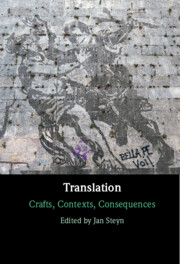Book contents
- Translation
- Translation
- Copyright page
- Dedication
- Contents
- Figures
- Contributors
- Acknowledgements
- Introduction
- Chapter 1 Solitude of the Translator
- Chapter 2 Translation, Creativity, Awareness
- Chapter 3 Anatomy of a Day in the Life of a Translator
- Chapter 4 Sturm, Drang and Slang
- Chapter 5 On X
- Chapter 6 Translating the Greeks
- Chapter 7 Beyond Faithfulness
- Chapter 8 Translation in and of Psychoanalysis
- Chapter 9 Translation across Brains and across Time
- Chapter 10 Covalent Effect
- Chapter 11 Notes on the Translator’s Space/The Editor’s Place
- Chapter 12 The State of Things
- Chapter 13 Translating into a Minor Language
- Chapter 14 An Other Language
- Chapter 15 Five Entries on Translation and Loss
- Chapter 16 ‘A Kind of Radical Positivity’
- Bibliography
- Index
Chapter 14 - An Other Language
Translation and Internationality
Published online by Cambridge University Press: 23 September 2022
- Translation
- Translation
- Copyright page
- Dedication
- Contents
- Figures
- Contributors
- Acknowledgements
- Introduction
- Chapter 1 Solitude of the Translator
- Chapter 2 Translation, Creativity, Awareness
- Chapter 3 Anatomy of a Day in the Life of a Translator
- Chapter 4 Sturm, Drang and Slang
- Chapter 5 On X
- Chapter 6 Translating the Greeks
- Chapter 7 Beyond Faithfulness
- Chapter 8 Translation in and of Psychoanalysis
- Chapter 9 Translation across Brains and across Time
- Chapter 10 Covalent Effect
- Chapter 11 Notes on the Translator’s Space/The Editor’s Place
- Chapter 12 The State of Things
- Chapter 13 Translating into a Minor Language
- Chapter 14 An Other Language
- Chapter 15 Five Entries on Translation and Loss
- Chapter 16 ‘A Kind of Radical Positivity’
- Bibliography
- Index
Summary
Just as the world is imagined as consisting of nations and conceived of as an international assemblage in modernity, the modern world projects the Babelian vision of a single humanity fragmented into many individual languages. This vision of the international juxtaposition of languages cannot be apprehended unless the modern regime of translation is taken into account, according to which two languages are postulated as distinct and individuated unities. This chapter investigates how a new set of presumptions led to a particular representation of two distinct languages as individuated, countable, and comparable unities between which translation is to take place. The modern regime of translation represents the event of translation in terms of two separate figures or schemata, just like two distinct territories of state sovereignties in the international world as sanctioned by the system of international law (Jus Publicum Europaeum).
Keywords
Information
- Type
- Chapter
- Information
- TranslationCrafts, Contexts, Consequences, pp. 227 - 250Publisher: Cambridge University PressPrint publication year: 2022
